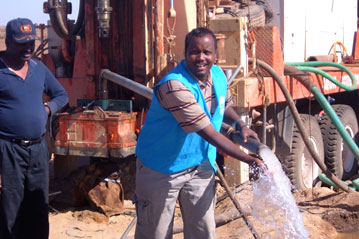UNHCR optimistic about meeting water needs of refugees in Ethiopia
UNHCR has always faced difficulties ensuring that refugees in eastern Ethiopia have enough water, but is optimistic that new projects will solve the problem.
ADDIS ABABA, Ethiopia, April 2 (UNHCR) - Over the past two decades, UNHCR has helped more than 600,000 Somali refugees in the eastern lowlands of Ethiopia. Providing them with enough water has always been a problem, with the UN refugee agency facing funding shortfalls, meagre and difficult to access underground reserves, and competition from locals for the scarce resource.
That's as true today as it was in 1991, when Somalia started disintegrating after the fall of the Siad Barre regime and people began fleeing. Most of the refugees eventually returned home, with just 16,000 remaining in Kebribeyah camp. But renewed conflict in Somalia has led to fresh influxes, prompting UNHCR to open the Aw Barre and Shedder camps in 2007 and 2008 respectively.
Under UNHCR's emergency guidelines, a person needs at least seven litres a day to survive and 20 litres a day to ensure their well-being and good health. Currently, that minimum standard of 20 litres is not being met in any of the three camps, but UNHCR believes that projects now under way should ensure that this target is reached and that access to water outlets is improved.
To meet the needs of Kebribeyah, the former Hartisheik camp and local communities, UNHCR in 2004 opened a pipeline to transport water from the well watered Jarar Valley, some 20 kilometres away.
But, as UNHCR Representative in Ethiopia Moses Okello noted, "Even this huge project does not guarantee an adequate supply of water to every family in the camp. Technical problems, and the high cost of managing the system, mean occasional failure to meet the minimum daily standard of water."
To resolve this problem, the UN refugee agency and the Ethiopian Electric Power Corporation have been working to connect the Jara Valley water supply system to the national electricity grid, which will make it cheaper to power the system than using fuel-guzzling generators. Okello believes this will solve many of the problems related to running the facility.
Meanwhile, to meet daily needs in the Aw Barre and Shedder camps, UNHCR had to truck large quantities of water from a nearby town, drill boreholes and construct a distribution network to ensure that refugees did not have to go far to get access to water.
Okello said that thanks to special funds made available for water and sanitation projects by UN High Commissioner for Refugees António Guterres, "We have been drilling and interconnecting half a dozen boreholes in the two camps. So far we have managed to provide a daily average of 12 litres per person in the two camps."
It is a work in progress. But Okello said he was optimistic that the minimum standard per person of 20 litres a day would be achieved in all three camps once the various water projects had been completed.
Somali refugee Rahma Mohammed Jamale, who fled to Ethiopia to escape conflict in Mogadishu, was one of the first residents of Shedder camp when it opened in May last year. She said it was initially tough finding enough water for herself and her six children.
"We had only two water points for a whole zone and that meant queuing up for hours to get a jerry can of water," she said, adding that the situation was much better but more work was still needed to increase the water supply for the camp's 6,600 refugees and Ethiopians living nearby.
Jamale said the improved water situation meant that children in the camp were spending more time in school and less time lining up for water. "But for this positive development to be sustained, it is up to us refugees to guard the system against misuse," she added.
By Kisut Gebre Egziabher in Addis Ababa, Ethiopia
Related news and stories
Thousands of newly arrived Somali refugees in Ethiopia relocated to new settlement
Samira's Story
Drought brings life-threatening food shortages for refugees in Ethiopia
100,000 new Somali refugees arrive in Ethiopia in the past month, UN and partners are calling for urgent funding
UNHCR teams and partners rush assistance to some 100,000 newly arrived Somali refugees in hard-to-reach area of Ethiopia
As the Horn of Africa drought enters a sixth failed rainy season, UNHCR calls for urgent assistance
-

Global Refugee Forum - list of stocktaking events in 2021
3 May 2021 This document contains a list of GFR stocktaking events taking place in 2021 (please check webpage www.unhcr.org/high-level-officials-meeting for further updates). In the lead-up to the High-Level Officials Meeting in Dec 2021, UNHCR is convening regional, thematic and stakeholder-specific stocktaking events throughout the year, to identify both progress and the areas where more efforts are needed, particularly in light of the socio-economic impacts of the COVID-19 pandemic. Stocktaking is conducted either through standalone events or integrated into other events or processes. -

Learning from Experience and Seizing Opportunities: UNHCR and partner practices in advancing gender equality in sub-Saharan Africa
3 May 2021 This report documents emerging and promising practices on gender equality from Niger, Nigeria, Cameroon, Chad, Uganda, Rwanda, Malawi and Kenya. It demonstrate the crucial importance of taking action to achieve gender equality even in the most challenging circumstances. -

Final Report
3 May 2021 -

Clean and Safe Energy in Refugee Settings: Moving forward on the Clean Energy Challenge
3 May 2021 Event flyer - On 3 June 2021, UNHCR will host an event called "Clean and Safe Energy in Refugee Settings: Moving forward on the Clean Energy Challenge". Referring to key energy pledges made in the context of the Global Refugee Forum in 2019, this event will spotlight how clean energy projects are already transforming the lives of refugees and local populations, present opportunities for further engagement and launch a Call to Action to anchor humanitarian energy to the global climate and energy agenda. -

Looking Back, Moving Forward: Private Sector Support for Refugees
3 May 2021 Event Flyer: On 5 May 2021, UNHCR is hosting an event called "Looking back, moving forward - Private sector support for refugees", which is a follow-up event to the Global Refugee Forum in 2019. This event aims to foster insightful conversation on the many ways the private sector can help refugees today and in a post COVID-19 world. -

Starting over is not easy but Burundian refugees are hopeful as they return home
3 May 2021 Hope and expectation as Burundian refugees return home after years in exile in Rwanda. -

UNHCR applauds US decision to increase refugee resettlement
3 May 2021 -

Evaluation of UNHCR-led Initiatives to End Statelessness
May 2021 This evaluation was commissioned by the UNHCR Evaluation Service to generate evidence and insights regarding UNHCR's work to support States to end statelessness and was timed to inform potential adjustments for the remaining years of GAP implementation. The evaluation covered the period of 2001 to 2020 with particular focus on actions and advocacy efforts of UNHCR and partners to support the GAP since 2014. Attachments: Executive Summary, Management Response and Annexes (.zip) -

Nearly 30,000 people displaced by March attacks in northern Mozambique
30 Apr 2021

